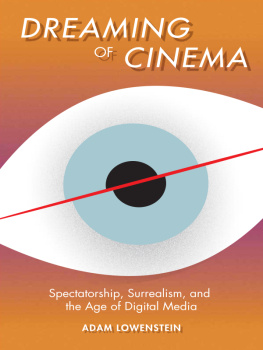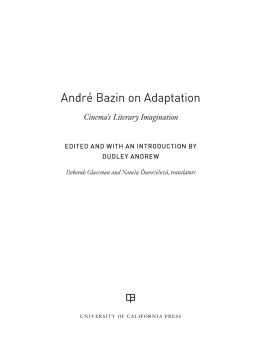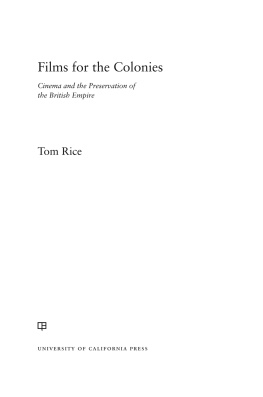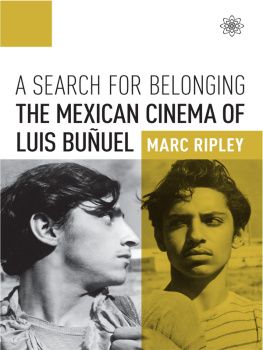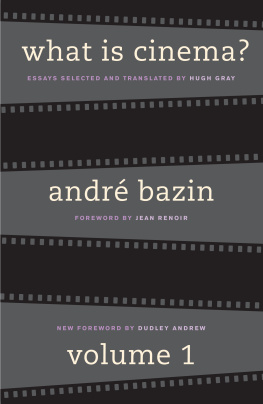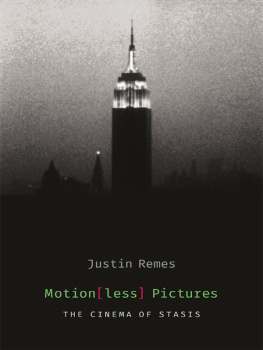DREAMING F CINEMA
FILM & CULTURE
John Belton, Editor
FILM & CULTURE
A series of Columbia University Press
Edited by John Belton
For the list of titles in this series see .
DREAMING
F
CINEMA
SPECTATORSHIP,
SURREALISM,
& THE AGE OF
DIGITAL MEDIA
ADAM LOWENSTEIN
Columbia University Press
New York
COLUMBIA UNIVERSITY PRESS
Publishers Since 1893
New York Chichester, West Sussex
cup.columbia.edu
Copyright 2015 Adam Lowenstein
All rights reserved
E-ISBN 978-0-231-53848-0
Library of Congress Cataloging-in-Publication Data
Lowenstein, Adam.
Dreaming of cinema : spectatorship, surrealism, and the age of digital media / Adam Lowenstein.
pages cm. (Film and culture)
Includes bibliographical references and index.
isbn 978-0-231-16656-0 (cloth : alk. paper) isbn 978-0-231-16657-7 (pbk. : alk. paper) isbn 978-0-231-53848-0 (ebook)
1. Motion picture audiences. 2. Surrealism in motion pictures. I. Title.
PN1995.9.A8L69 2015
302.2343dc23
2014026068
A Columbia University Press E-book.
CUP would be pleased to hear about your reading experience with this e-book at .
COVER & INTERIOR DESIGN BY MARTIN N. HINZE
References to websites (URLs) were accurate at the time of writing. Neither the author nor Columbia University Press is responsible for URLs that may have expired or changed since the manuscript was prepared.
For Irina, as always
and for Simone, for the first time
Contents
T he surrealists knew that we never truly dream alone, and so it is for this book as well. I cannot hope to include by name all of the people who helped me along the way during this books long process of coming into being, but I am deeply grateful to all of the friends, family members, colleagues, and students who contributed their time, expertise, good will, and understanding while I was dreaming of cinema.
For acts of professional support both large and small, I thank Richard Allen, Dudley Andrew, Jonathan Arac, John Belton, Tim Corrigan, Peter Decherney, David Desser, Lucy Fischer, Jen Florian, Rosalind Galt, Lalitha Gopalan, Tom Gunning, Randall Halle, Adam Hart, E. Ann Kaplan, Jim Lastra, Colin MacCabe, Keiko McDonald, Jim Naremore, Bill Paul, Donald Richie, Matt Rockman, Karl Schoonover, Terry Smith, Rajiv Vrudhula, and Phil Watts. Years of delightful intellectual conversation (including that most precious kind of conversation, co-teaching) with Marcia Landy have left impressions all over this book.
Important institutional support came from the George A. and Eliza Gardner Howard Foundation, which provided a fellowship that allowed me time to pursue research for this book. At the University of Pittsburgh, I wish to thank the Department of English, Humanities Center, University Center for International Studies, Japan Council, Asian Studies Center, and Office of the Dean in the Kenneth P. Dietrich School of Arts and Sciences. In Tokyo, Yuka Sakano of the Kawakita Memorial Film Institute was invaluable as my point of contact with director Hideo Nakata and screenwriter Hiroshi Takahashi, both of whom made themselves available to me in remarkably generous ways. Kenjin Miwa and the staff at the National Museum of Modern Art in Tokyo were also very helpful. Additional archival support came from Robert A. Haller at Anthology Film Archives in New York. Audiences at the Cinema Studies Colloquium (University of Pennsylvania), Department of Radio-TV-Film (University of Texas at Austin), Humanities Center Colloquium (University of Pittsburgh), Mass Culture Workshop (University of Chicago), Pittsburgh Film Colloquium (University of Pittsburgh), and the Society for Cinema and Media Studies Conference offered stimulating feedback on my work in progress. Earlier versions of some of the material included in this book have appeared in Cinema Journal, Post Script, and Global Art Cinema: New Theories and Histories (Oxford University Press); I am grateful for the permission of the publishers to draw on that material here. Thanks are due to the Artists Rights Society, Art Resource New York, the Museum of Modern Art, and the Smithsonian American Art Museum (Joseph Cornell Study Center) for aid in reproducing the images included in this book.
Working once again with the stellar team at Columbia University Press was just as pleasurable as the first time around, only this time I felt even more at home thanks to director Jennifer Crewe, series editor John Belton, assistant editor Kathryn Schell, production editor Roy Thomas, copy editor Joe Abbott, cover and interior designer Martin Hinze, and the anonymous readers of the manuscript.
It saddens me greatly that so many special friends and colleagues who contributed all sorts of inspiration while I worked on this project are no longer here to share the book. I will always hear their voices within these pages: Eric Clarke, Miriam Bratu Hansen, Keiko McDonald, Anil Ramayya, Donald Richie, Richard Tobias, Phil Watts, and my aunt Marion Sue Lane, whose love of writing about and caring for animals enriched my life and animated this books fourth chapter.
First and last and always, I must thank my family for everything: Ed Lowenstein, Paula Friedman, Jane Lowenstein, and Noah Lowenstein. I dedicate this book to my wife Irina Reyn and our daughter Simone Lowenstein, with love. They remind me of the real in the surreal, as well as the surreal in the real, in just the right ways.
H ow can one grasp the present? Especially a present as fast and fleeting as our own, where new digital media technologies transform our modes of perception, awareness, and experience in dizzying ways? This book grows out of a desire to understand our present age of digital media, even as that era continues to metamorphose at a pace that stuns the imagination; there is something appropriate affectively, however misleading historically, in calling the digital era the age of new media.
First of all, the surrealists enthusiasm for cinema derived partially from their own excitement, beginning in the 1920s, with film as a new, quintessentially modern media form. The hopes and dreams of the surrealists for cinemas future, some prescient and others outlandish, can often remind us of todays sometimes wildly careening discourses surrounding digital mediathe utopian or dystopian ways it has changed and will change our lives, its potential to make obsolete, superfluous, or barely recognizable so much that has gone before while it opens new horizons of information, expression, and communication. Surrealist fascination with cinema, like our own fascination with digital media, pivots on the technologically and culturally new. Cinema was new media for the surrealists just as surely as todays digital technologies are new media for us.
So the specter of cinemas decline or even extinction in the digital era arrives as a crisis of realisma crisis that surrealism is ideally equipped to engage because it never assumed cinema was a realist medium but rather a surrealist one. In this way, returning to surrealist conceptions of cinema enables us to move beyond the mirage of a digitally induced crisis of realism. Seeing through this mirage means rethinking cinemas relation to the real but not because digital media has changed everything. On the contrary, the ascent of digital media invites us to recognize that cinema always was and continues to be a deeply surrealist medium rather than an inherently realist one. Coming to terms with this recognition drives this books research, as it is one of the most pressing tasks of contemporary film theory.

